So: your home planet has been destroyed. Or maybe not your home planet; maybe just the planet you were currently residing on. Either way, you find yourself suddenly without a planet (always an awkward position to be in), but at least with a spacecraft and an interstellar library of choice Earth works to tide you over on the long hyperspace journey to whatever world is nearest, which hopefully has not also been destroyed (though you never can tell). Thankfully, you were smart enough to load up your ship’s computer with the entire archive of Tor.com articles, and you can refer to this helpful list to choose the correct title to comfort you in the vast emptiness of space…
The Hitchhiker’s Guide To the Galaxy by Douglas Adams
And no, this isn’t meant to refer to the guide within The Guide—otherwise known as “functionally Galactic Wikipedia”—but rather the novel itself; Adam’s seminal work regarding the sheer vastness (and strangeness) of a nearly infinite universe is the root from which all other witty space-faring adventures spring. The story of Earthman—and your fellow “lack of homeworld haver”—Arthur Dent being dragged across an uncaring cosmos to seek out the answer to Life, The Universe, and Everything should be a fantastic reminder that, even if your world has been destroyed, there are still adventures to have, and also that you shouldn’t panic, so long as you have your towel.
Buy the Book
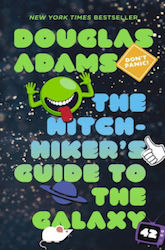

The Hitchhiker’s Guide to the Galaxy
The Long Way to a Small, Angry Planet by Becky Chambers
Speaking of the call to adventure—who needs your home planet! It was kind of worn around the edges anyway, right? And so what if your current craft is just as careworn: there’s no better reminder that the best adventures start from nothing than Chambers’s tale of Rosemary Harper and the family of neurotics, misanthropes, and degenerates (called so lovingly) that Harper meets on board the Wayfarer in its journey across the galaxy. Your world might be gone, but there should be plenty of others out there, and plenty of crews willing to take you on—and if you find one even half as good-natured as the cast of Chambers’s novel, you should be in good hands (or paws, or claws, or fins, or what have you).
Buy the Book
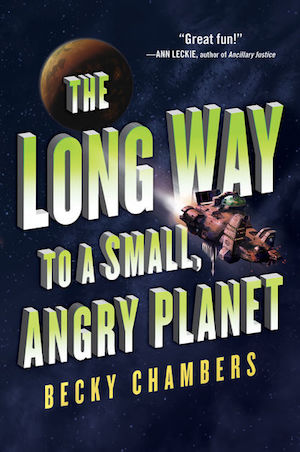

The Long Way to a Small, Angry Planet
Everything Matters! by Ron Currie Jr.
Perhaps it wasn’t just your homeworld that was destroyed, however—perhaps it was a cascading failure of physics or calamity, even now spreading across the galaxy, a statement by some hidden force or intergalactic deity that this universe is done, that humanity in general is done, and it’s only a matter of time before that cascading failure catches up with your small, lonely vessel, adrift in the cosmos. In that particular case, there’s no better volume to turn to than Ron Currie Jr.’s novel, a wellspring of compassion, humanism, and a reminder of the power acceptance can bring. The tale of Junior Thibodeau—born with the knowledge, implanted in his mind by some alien being, that humanity will meet its utter devastation thirty-six years hence—and his desperate, ultimately futile rage against the inevitable will be a helpful reminder that even if your universe does, for all intents and purposes, cease to exist, the kindness and decency of humanity will have left their own mark, one far greater than whatever harm we might have wrought.
Buy the Book
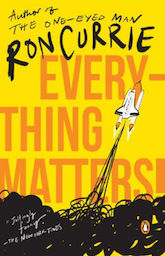

Everything Matters!
The Unnoticeables by Robert Brockway
Or perhaps it wasn’t some sort of plague or intergalactic weaponry that destroyed your world—perhaps it was something unknowable, ancient, and full of hate: Lovecraftian horrors from beyond the cosmos that only seek to destroy or twist or eat. In that case, your best option might be to find inspiration in Brockway’s rollicking dual narrative of 1970s punks and a stuntwoman from the late 2000s facing off against unimaginable terrors that seek to destroy the world through sedition and absorption. Beer, anarchy, beer, a flagrant disregard for social norms, beer, an utter lack of anything resembling fear (or rational intelligence, really) and beer are what power Brockway’s characters; if you’re facing off with some similar unknowable horror, there are almost certainly lessons to be learned here.
Buy the Book
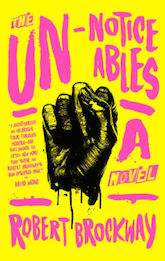

The Unnoticeables
The World Without Us by Alan Weisman
All right, worst case scenario: your spacecraft hasn’t managed to escape your devastated world, though it has insulated you from whatever plague/disaster wiped humanity off of its surface (if that isn’t the case, then you’re not likely reading this, and there’s not much Tor.com can do to help you). In that case, you’ll have no better reference to than Weisman’s non-fiction chronicle, a moment-to-moment guide to exactly how a world would fall apart after humanity’s disappearance. From what happens to our pets (feel bad for your dog; feel… less bad for your cat) in the immediate aftermath to a eons-later examination of what might still remain to mark humanity’s existence, Weisman’s work is a fantastic guide for what will await you in some sort of Richard Matheson, I Am Legend situation.
Buy the Book
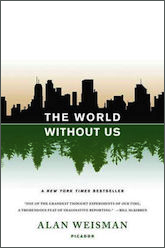

The World Without Us
Hopefully, whatever it is that awaits you beyond the destruction currently preying on your psyche, one of these five books will help guide you through the aftermath. Regardless of whether you’re setting down to view the sunset on a world suddenly bereft of humanity, or heading into the unknown of the cosmos to find further adventure beyond the bounds of your (former) home, Tor.com wishes you the best in your continuing existence even in the face of unimaginable tragedy!
Originally published in September 2018.
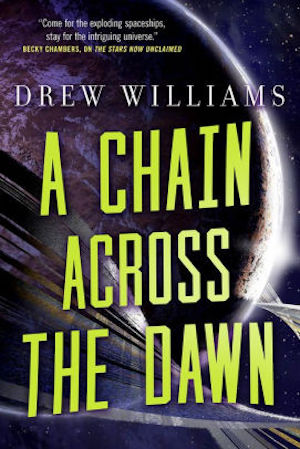 DREW WILLIAMS has been a bookseller in Birmingham, Alabama, since he was sixteen years old, when he got the job because he came in looking for work on a day when someone else had just quit. Outside of arguing with his coworkers about whether Moby-Dick is brilliant (nope) or terrible (that one), his favorite part of the job is discovering new authors and sharing them with his customers. A Chain Across the Dawn—book two in the space opera series that began with The Stars Now Unclaimed—is available from Tor Books May 7th.
DREW WILLIAMS has been a bookseller in Birmingham, Alabama, since he was sixteen years old, when he got the job because he came in looking for work on a day when someone else had just quit. Outside of arguing with his coworkers about whether Moby-Dick is brilliant (nope) or terrible (that one), his favorite part of the job is discovering new authors and sharing them with his customers. A Chain Across the Dawn—book two in the space opera series that began with The Stars Now Unclaimed—is available from Tor Books May 7th.










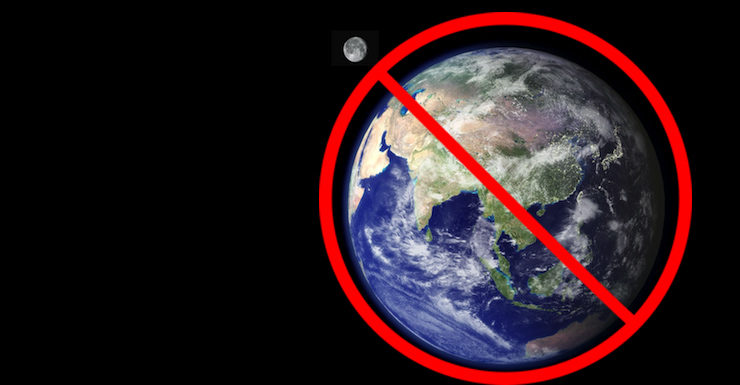
The top of this list indicates that Drew Williams is clearly a hoopy frood who knows where his towel is.
Becky Chambers’ newest book, Record of a Spaceborn Few, is even more appropriate as it is set on the colony stations that is where the bulk of humans survived away from Earth.
And if you have an option for video as well as books, the “AE” in Titan: AE stands for “After Earth”.
This is of course assuming that you WANT to think about the fact that the planet has been destroyed.
I’d add Seveneves to the list. It’s actually the moon that explodes (never explained), but Earth is rendered uninhabitable for 5000 years.
“you were smart enough to load up your ship’s computer with the entire archive of Tor.com articles”
The funny bit is that reading material is severely restricted. You would only be able to have one, one, itty bitty e-book on your tablet device at a time. Because giving people any more storage space would inevitably lead to porn addiction. I kid you not.
The Earth in The World Without Us was doing just fine, as were almost all of the living things in it (except perhaps human head and body lice, Guinea worms etc.). It was just the human species that was gone.
No love for Gaunt’s Ghosts? Admittedly, planets getting blown up is a fairly common occurrence in Warhammer 40,000, but the destruction of Tanith is a pretty major plot point for the novels, with the Ghosts’ desire to liberate a “New Tanith” something that comes up a fair amount, particularly in the earlier books. It’s certainly something Gaunt himself can’t really forget, especially considering how elements of the regiment have tried to murder him about in the past…
Megan Crewe’s YA trilogy (Earth and Sky, The Clouded Sky, and A Sky Unbroken) start with time travel and aliens, and suddenly at the end of book 2, the Earth is gone and a small group of salvaged humans, including humans who have been living with the aliens as essentially pets, are all that’s left. It really upped the stakes of the whole series.
James Follett”s Earthsearch and Greg Bear”s The Anvil of Stars take opposing yet similar feeling approaches to what to do afterwards, alongside a bit of AI gone wrog and a fair bit of Adam and Eve.
@@.-@: Yeah, people seem to make that mistake a lot. To those who haven’t read it: The World Without Us presents a thought experiment. There’s no mass die-off, no destructive event. We just–poof out. Weisman then examines the consequences as a way of revealing how much of what we see around us is affected by us.
John Varley’s Eight Worlds stories.
Wylie and Balmer’s When Worlds Collide ought to be included as one of the early inspirations for this genre. Made a good film, too.
humanity will meet its utter devastation thirty Apollo 11
Read Toby Litt’s _Journey Into Space_, then go back and make sure.
@10 loved the film’s ending, where pure Boxer puppies were born of a mongrel mutt :0
Space travel can do strange things!
After Doomsday by a verging on forgotten Poul Anderson in an older tradition of problem solving mentions a couple of actually useful schemes – one of which works out well.
I’ll second Bear’s Anvil of Stars and raise you The Forge of God, which explains how the earth was destroyed and details the rescue of humanity.
The problem with lists like this is that they usually reference only (very) recent books. With that in mind, I nominate Greg Bear’s two volume Forge of God Series, which starts with (the obviously titled) The Forge of God and what maybe the ultimate revenge novel, Anvil of Stars. Read them; you won’t be disappointed.
No mention of World Wrecker Hamilton?
Earliest books on this subject I remember reading were “The Beast Master” and “Lord of Thunder” by Andre Norton. It was the first time I’d read SF in which the Earth had been destroyed, and the consequences for the survivors, and it really creeped me out at the time. Those books were also noteworthy for having a Native American protagonist, which was highly unusual at the time (early 1960’s).
Started reading FORGE OF GOD — thanks for the reminder, all. Finally.
Bought a used hard cover in great shape. The Kindle version of Forge is apparently rife with typos on the scanning process that was used.
As soon as I read the title, I thought, “Surely this list must include Delany’s Stars in My Pocket Like Grains of Sand,” and I doubly thought so when an early paragraph mentioned having access to the Tor site’s archives (more than one article about that book on the site). But nope! The personal and political aftermath of having a planet explode is probably the biggest takeaway from the book… I rarely comment here and thought the other commenters would surely mention this before I had to, but I was wrong again… anyhow, it’s an amazing book on this subject.